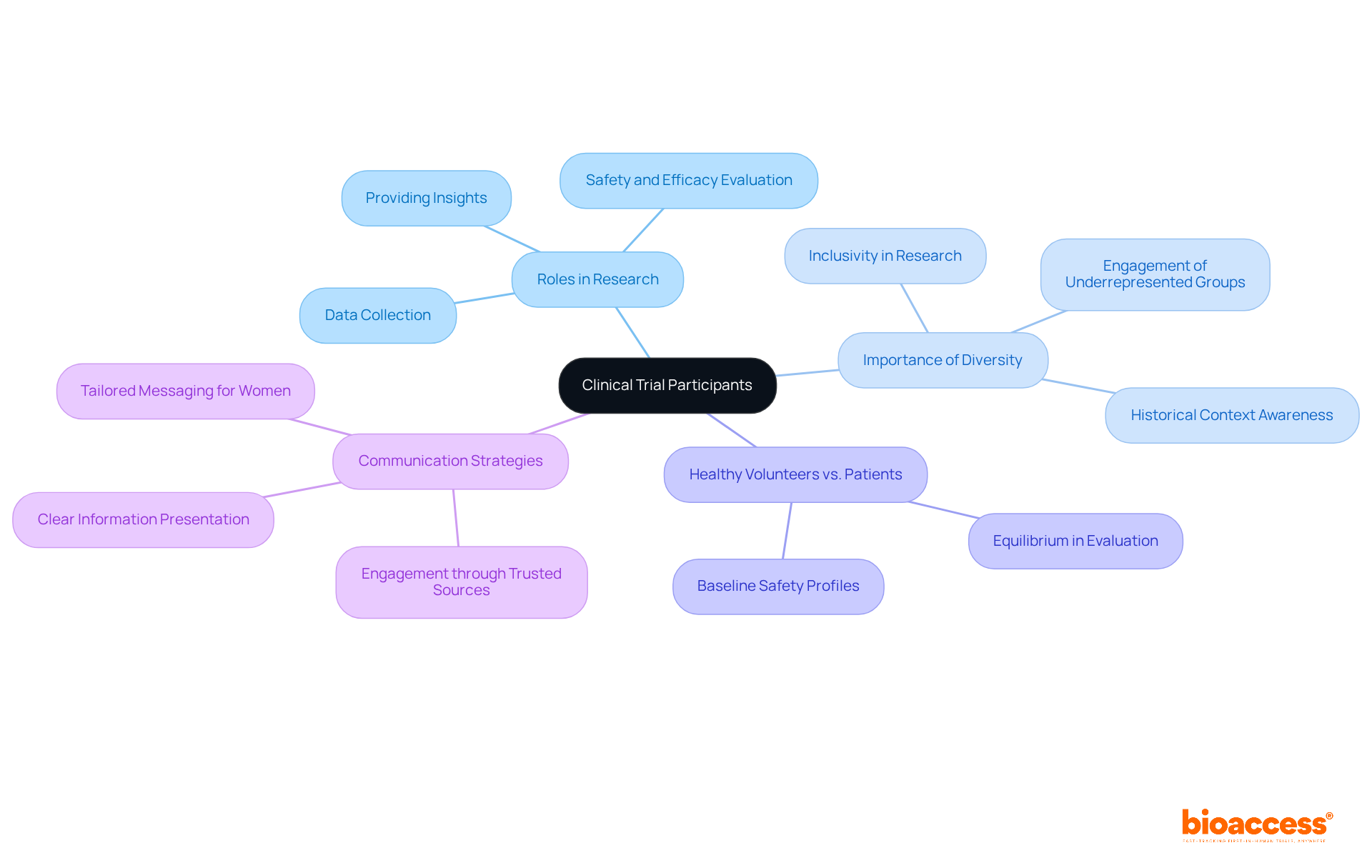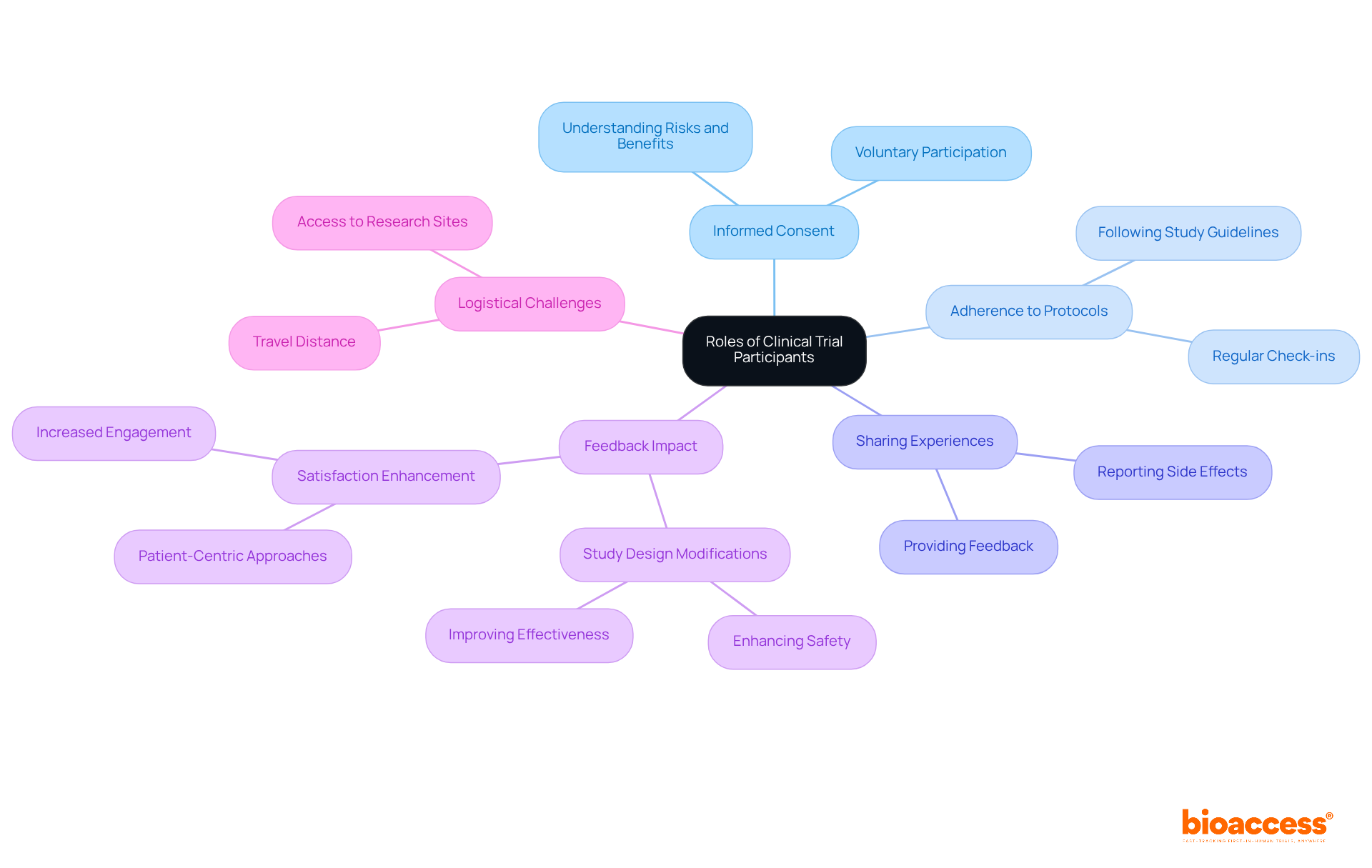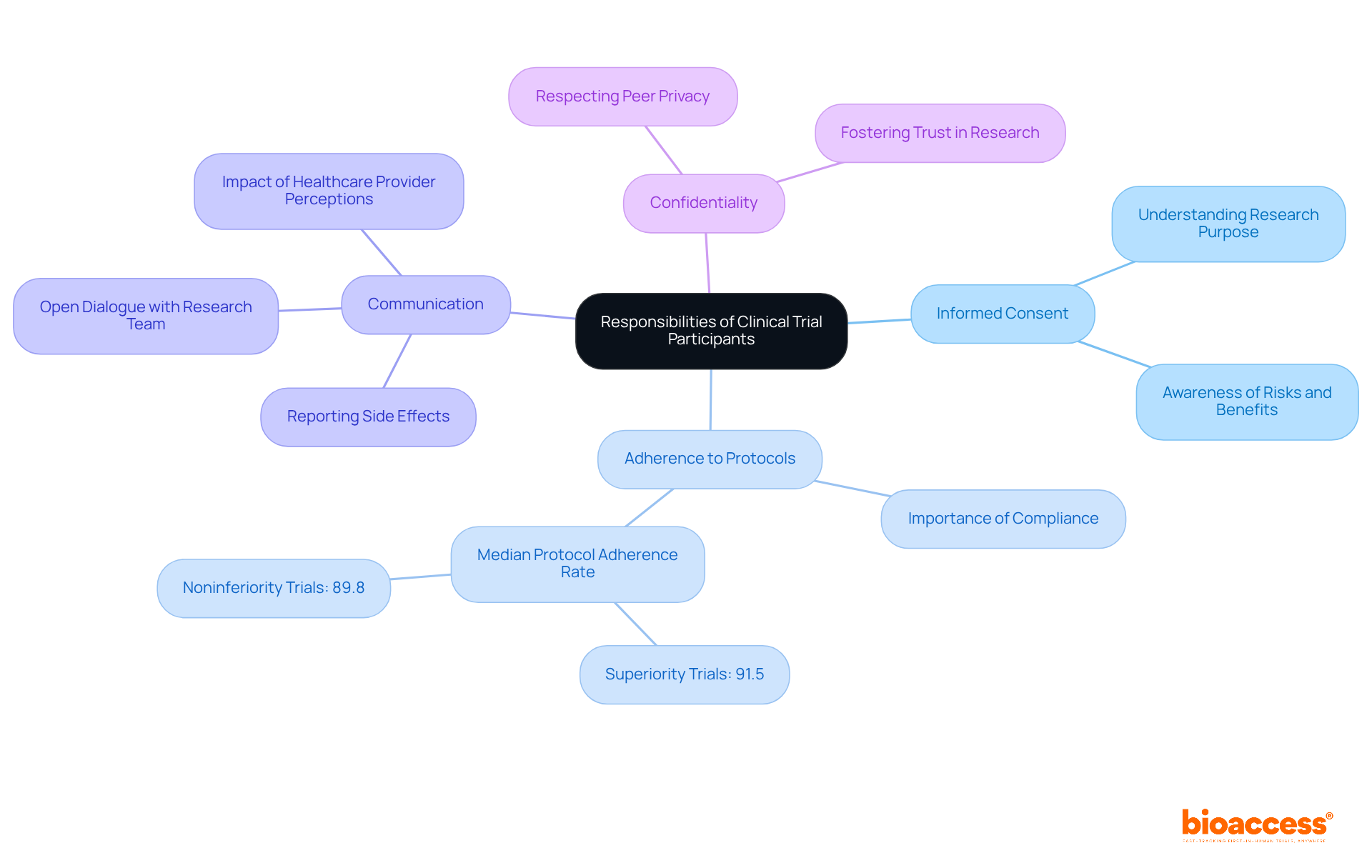


Clinical trial participants are essential to the success of medical research. They provide crucial data on the safety and efficacy of new treatments, while their feedback and experiences significantly shape study designs. Their involvement not only propels medical science forward but also enhances participant health outcomes. This underscores the critical importance of diversity and effective communication in improving recruitment and engagement in clinical studies.
Clinical trial participants stand as the unsung heroes of medical research, providing essential insights that shape the future of healthcare. Their involvement not only aids in assessing the safety and efficacy of new treatments but also propels the evolution of inclusive research practices that reflect diverse populations.
Yet, as the demand for innovative therapies escalates, how can the healthcare community ensure that these participants are effectively engaged and supported throughout the research process?
By exploring the multifaceted roles and responsibilities of clinical trial participants, we uncover not only their critical contributions but also the challenges that must be addressed to enhance their participation in advancing medical science.
Clinical trial participants are vital contributors in research investigations designed to evaluate new medical therapies, medications, devices, or methods. Clinical trial participants, whether healthy volunteers or patients with specific medical conditions, play a crucial role in gathering data on the safety and efficacy of new interventions. As we look toward 2025, the landscape of medical studies is evolving, with a growing recognition of the importance of diverse representation among contributors. For instance, Walgreens has successfully engaged over 4 million patients for potential participation in research studies, with more than 60% being women, underscoring the necessity for inclusivity in research.
The contributions of research study volunteers extend far beyond mere data collection; they are fundamental to the advancement of medical science. Their experiences and outcomes yield invaluable insights that guide the development of effective treatments. Notably, a significant proportion of clinical trial participants are healthy volunteers, which is essential for establishing baseline safety profiles for new interventions. The equilibrium between healthy volunteers and patients is critical in ensuring thorough evaluation processes.
Experts assert that effective communication is paramount in enhancing participation rates. Dr. Yvette Cozier highlights that when information is presented clearly, individuals, particularly from underrepresented groups, are more likely to engage in research studies. This perspective is supported by Dr. Beth Garner, who advocates for the inclusion of diverse individuals to guarantee that medical products are effective for the populations that will ultimately utilize them. As the healthcare sector continues to evolve, the role of clinical study contributors remains a cornerstone of successful medical research.

Clinical trial participants occupy a pivotal role in the research process, extending beyond mere subjects of examination. Clinical trial participants provide informed consent, adhere to research protocols, and share their experiences and side effects, which are vital for the integrity of the trial. By engaging in discussions with researchers regarding their health and treatment preferences, individuals contribute insights that can profoundly influence the study's design and implementation. For instance, feedback from clinical trial participants has led to protocol modifications aimed at enhancing safety and effectiveness, underscoring their dynamic and significant role.
Studies reveal that 93.6% of individuals with chronic or acute conditions prioritize the ability to complete the entire study, highlighting the importance of engagement in shaping study parameters. Furthermore, research indicates that 73% of patients prefer discovering clinical research opportunities through their healthcare providers, emphasizing the need for effective communication strategies within clinical environments.
Incorporating patient insights into study design not only enhances satisfaction among clinical trial participants but also improves the overall quality of research outcomes. For example, actual patients reviewing study documents can ensure accessibility and clarity, resulting in more informed individuals. This collaborative approach fosters a more inclusive research environment for clinical trial participants, ultimately contributing to more generalizable findings and enhancing successful recruitment efforts.
Logistical challenges, such as travel distance, also significantly impact recruitment, as many potential participants may live far from research sites. Addressing these obstacles is essential for improving the rates of clinical trial participants and ensuring that studies accurately represent the populations they aim to assist. In this regard, bioaccess's comprehensive management services for research—including feasibility assessments, compliance evaluations, site selection, project oversight, and reporting—play a crucial role in enhancing engagement and streamlining the recruitment process. Additionally, the partnership between bioaccess and Caribbean Health Group aims to establish Barranquilla as a leading hub for clinical studies in Latin America, supported by Colombia's Minister of Health, which can greatly bolster local economic development and advance healthcare.

The success of research studies heavily relies on clinical trial participants, who carry several key responsibilities that are essential for the integrity of clinical research.
Informed Consent: Participants must thoroughly read and understand the informed consent document, which outlines the purpose of the research, procedures, potential risks, and expected benefits. This process is vital for ensuring that participants are fully aware of what their involvement entails.
Adherence to Protocols: Participants are expected to strictly follow the study protocols. This includes attending scheduled visits, taking medications as prescribed, and completing any required questionnaires. Following these protocols is crucial for preserving the integrity of the study and guaranteeing precise results for every clinical trial participant. Notably, the median protocol adherence rate for superiority studies was 91.5%, while for noninferiority studies, it was 89.8%. These statistics underscore the importance of participant compliance in achieving reliable outcomes.
Communication: Open communication with the research team is critical. Clinical trial participants should promptly report any side effects, health changes, or concerns that arise during the study. This feedback is invaluable for monitoring safety and efficacy throughout the research. As highlighted by Ken Getz, many healthcare providers feel that the demands of clinical trials may not be appropriate for certain patients, which can affect their willingness to participate and communicate openly.
Confidentiality: Individuals must respect the privacy of their peers and uphold the integrity of the study. This commitment helps protect the privacy of all involved and fosters a trustworthy research environment.
By fulfilling these responsibilities, contributors significantly enhance the reliability and validity of the research findings, ultimately advancing medical knowledge and patient care. Furthermore, it is essential to acknowledge the public health issue concerning the potential introduction of substandard interventions into medical practice due to erroneous validation of noninferiority, which highlights the necessity for careful compliance and communication from individuals involved.

Clinical trial participants are essential to the advancement of medical understanding and the development of new therapies. Their involvement allows researchers to gather crucial data regarding the safety and efficacy of emerging treatments, leading to groundbreaking advancements in healthcare.
For instance, research studies have been instrumental in the creation of life-saving medications for conditions such as cancer, diabetes, and cardiovascular diseases. Participants often gain access to cutting-edge treatments before they are available to the general public, thereby enhancing their own health outcomes while simultaneously contributing to the well-being of future patients.
A notable example is the first-in-human study of Flow-FX's innovative Flow-Screw medical device for intraosseous antibiotic delivery, conducted in collaboration with bioaccess™ in Barranquilla, Colombia. This initiative not only positions Barranquilla as a premier site for medical studies in Latin America but also underscores the commitment of organizations like bioaccess™ and Flow-FX to improve patient outcomes.
As a clinical trial participant, individuals actively influence their health journeys and play a crucial role in shaping the future landscape of medicine. This collaborative effort between participants and researchers is vital for driving forward the innovations that can transform healthcare.

Clinical trial participants are the cornerstone of medical research, playing an essential role in the evaluation of new therapies and treatments. Their involvement is crucial not only for gathering vital data on safety and efficacy but also for fostering a collaborative environment that propels innovations in healthcare. As the landscape of clinical research evolves, the focus on diversity and effective communication among participants is increasingly recognized as fundamental for achieving meaningful outcomes.
Throughout this discussion, various aspects of the contributions made by clinical trial participants have been underscored. These include responsibilities such as:
Additionally, the significance of incorporating patient insights into study designs has been highlighted, demonstrating how participant feedback can enhance both engagement and the quality of research. The logistical challenges faced by potential participants further emphasize the necessity of strategic solutions to ensure broad representation and accessibility in clinical studies.
The importance of clinical trial participants transcends individual studies; their involvement significantly shapes the future of medicine and public health. By participating in clinical trials, individuals not only gain access to cutting-edge treatments but also contribute to the development of therapies that can benefit countless others. As the medical community continues to prioritize inclusive and effective research practices, the call to action is evident: supporting and recognizing the vital contributions of clinical trial participants is essential for advancing healthcare and improving patient outcomes.
What are clinical trial participants?
Clinical trial participants are individuals who contribute to research investigations aimed at evaluating new medical therapies, medications, devices, or methods. They can be healthy volunteers or patients with specific medical conditions.
Why are clinical trial participants important?
They play a crucial role in gathering data on the safety and efficacy of new interventions, which is essential for the advancement of medical science. Their experiences and outcomes provide valuable insights that guide the development of effective treatments.
What is the significance of diverse representation among clinical trial participants?
Diverse representation is vital to ensure that medical products are effective for the populations that will ultimately use them. Engaging a variety of participants helps to gather comprehensive data that reflects different demographics.
How many patients has Walgreens engaged for potential participation in research studies?
Walgreens has successfully engaged over 4 million patients for potential participation in research studies, with more than 60% of these being women.
What role do healthy volunteers play in clinical trials?
Healthy volunteers are essential for establishing baseline safety profiles for new interventions, helping to ensure that the evaluation processes are thorough.
What do experts say about communication in relation to clinical trial participation?
Experts assert that effective communication is crucial for enhancing participation rates. Clear information presentation increases the likelihood of individuals, especially from underrepresented groups, engaging in research studies.
Who are some advocates for diverse participation in clinical trials?
Dr. Yvette Cozier and Dr. Beth Garner are advocates for the inclusion of diverse individuals in clinical trials to ensure that medical products are effective for various populations.